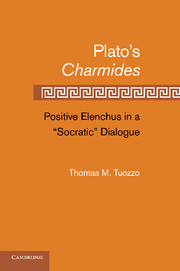Book contents
- Frontmatter
- Contents
- Acknowledgments
- Part One Approaching The Dialogue
- Part Two Approaching The Argument
- Part Three The Dialectical Investigation
- 5 σωϕροσύνη and Its Value
- 6 σωϕροσύνη as Self-Knowledge: Two Reformulations
- 7 Possibility of Self-Knowledge: Critian Formulation
- 8 Possibility of Self-Knowledge: Socratic Formulation
- 9 Return of the Value Question
- 10 Socrates??? Final Speech and Closing Scene
- 11 σωϕροσύνη, Knowledge, and the Good
- Works Cited
- General Index
- Index of Passages
7 - Possibility of Self-Knowledge: Critian Formulation
Published online by Cambridge University Press: 05 February 2012
- Frontmatter
- Contents
- Acknowledgments
- Part One Approaching The Dialogue
- Part Two Approaching The Argument
- Part Three The Dialectical Investigation
- 5 σωϕροσύνη and Its Value
- 6 σωϕροσύνη as Self-Knowledge: Two Reformulations
- 7 Possibility of Self-Knowledge: Critian Formulation
- 8 Possibility of Self-Knowledge: Socratic Formulation
- 9 Return of the Value Question
- 10 Socrates??? Final Speech and Closing Scene
- 11 σωϕροσύνη, Knowledge, and the Good
- Works Cited
- General Index
- Index of Passages
Summary
At the end of his long speech on the Delphic oracle, Critias offered self-knowledge as an account of σωϕροσύνη. Socrates’ subsequent questioning led to the development of two distinct formulations of that account, which I have labeled “Critian” and “Socratic.” Socrates then announced a new beginning and set forth a two-part program of investigation: first, assessing the possibility of σωϕροσύνη conceived as self-knowledge; second, assuming that self-knowledge is possible, determining its usefulness. At the start of the possibility discussion, Socrates turns his attention specifically to the Critian formulation (167b10–c1). He begins with a confession of his own ἀπορία and with the expression of his hope that Critias will prove to be “more resourceful” (εὐπορώτερος) than he is in this matter (167b7–9). The discussion of the Critian formulation ends with Critias’ “catching” his ἀπορία, as one person’s yawning may set off another’s. At that point Socrates turns to consider the possibility of σωϕροσύνη as self-knowledge under the Socratic formulation. In this chapter, we are concerned with the discussion of σωϕροσύνη under the Critian formulation.
The Critian formulation, as Socrates restates it at the beginning of this section, is as follows:
[σωϕροσύνη is] a certain single knowledge which is a knowledge not of anything other than of itself and of the rest of the knowledges – and also, this same knowledge, of non-knowledge. (167b10–c2)
Information
- Type
- Chapter
- Information
- Plato’s CharmidesPositive Elenchus in a 'Socratic' Dialogue, pp. 209 - 235Publisher: Cambridge University PressPrint publication year: 2011
